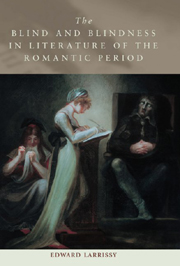Book contents
- Frontmatter
- Contents
- Preface
- Acknowledgements
- 1 The Enigma of the Blind
- 2 The Celtic Bard in Ireland and Britain: Blindness and Second Sight
- 3 Blake: Removing the Curse by Printing for the Blind
- 4 Edifying Tales
- 5 Wordsworth's Transitions
- 6 Coleridge, Keats and a Full Perception
- 7 Byron and Shelley: The Blindness of Reason
- 8 Mary Shelley: Blind Fathers and the Magnetic Globe: Frankenstein with Valperga and The Last Man
- 9 Conclusion
- Bibliography
- Index
5 - Wordsworth's Transitions
Published online by Cambridge University Press: 12 September 2012
- Frontmatter
- Contents
- Preface
- Acknowledgements
- 1 The Enigma of the Blind
- 2 The Celtic Bard in Ireland and Britain: Blindness and Second Sight
- 3 Blake: Removing the Curse by Printing for the Blind
- 4 Edifying Tales
- 5 Wordsworth's Transitions
- 6 Coleridge, Keats and a Full Perception
- 7 Byron and Shelley: The Blindness of Reason
- 8 Mary Shelley: Blind Fathers and the Magnetic Globe: Frankenstein with Valperga and The Last Man
- 9 Conclusion
- Bibliography
- Index
Summary
The topic of blindness figures in some of Wordsworth's most important poems, and is associated with central developments in his thought. The blind man, for instance, appears in a famous passage in ‘Tintern Abbey’; the Blind Beggar passage in Prelude VII is essential to the understanding of the poem; and Alan Bewell makes a good case for regarding the speaker of the Intimations Ode as ‘the blind poet’. And despite Wordsworth's reservations about Macpherson, there are occasional similarities between the self-presentation of the speaker in The Prelude and in the Ossian poems. There is sometimes an autobiographical element in play: from at least early 1805, Wordsworth suffered a tormenting disease of the eyes, trachoma, in which the insides of the eyelids are afflicted with hard pustules; the disease was spread in these years by soldiers returning from the wars. From 1820 onwards, he often wore a green eye-shade, in and out of doors. Not surprisingly, the disease ‘raised the spectre of future blindness’. Some late passages in the 1805 Prelude may have been influenced by Wordsworth's reflections on his condition. An interest in blindness and the blind pre-dates this affliction, however. And given the importance to many Enlightenment philosophers of examples drawn from the condition of the blind, and of speculation about their experience, it is scarcely surprising that these things should matter also to a poet who read those philosophers, and who was also concerned with the role of mental images in the development of intellectual and moral life.
- Type
- Chapter
- Information
- The Blind and Blindness in Literature of the Romantic Period , pp. 102 - 140Publisher: Edinburgh University PressPrint publication year: 2007

